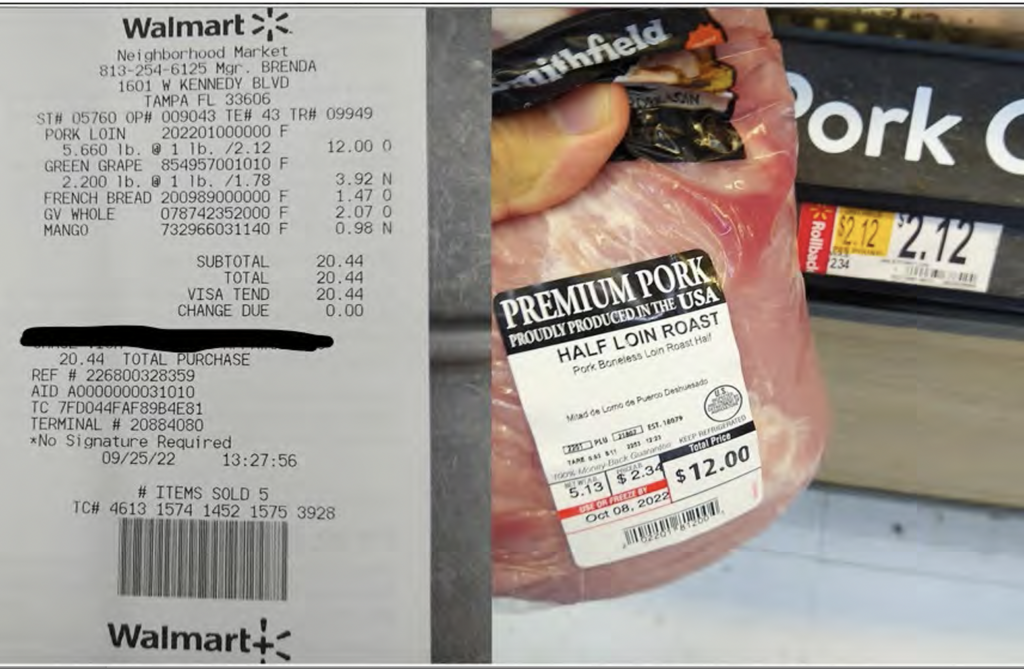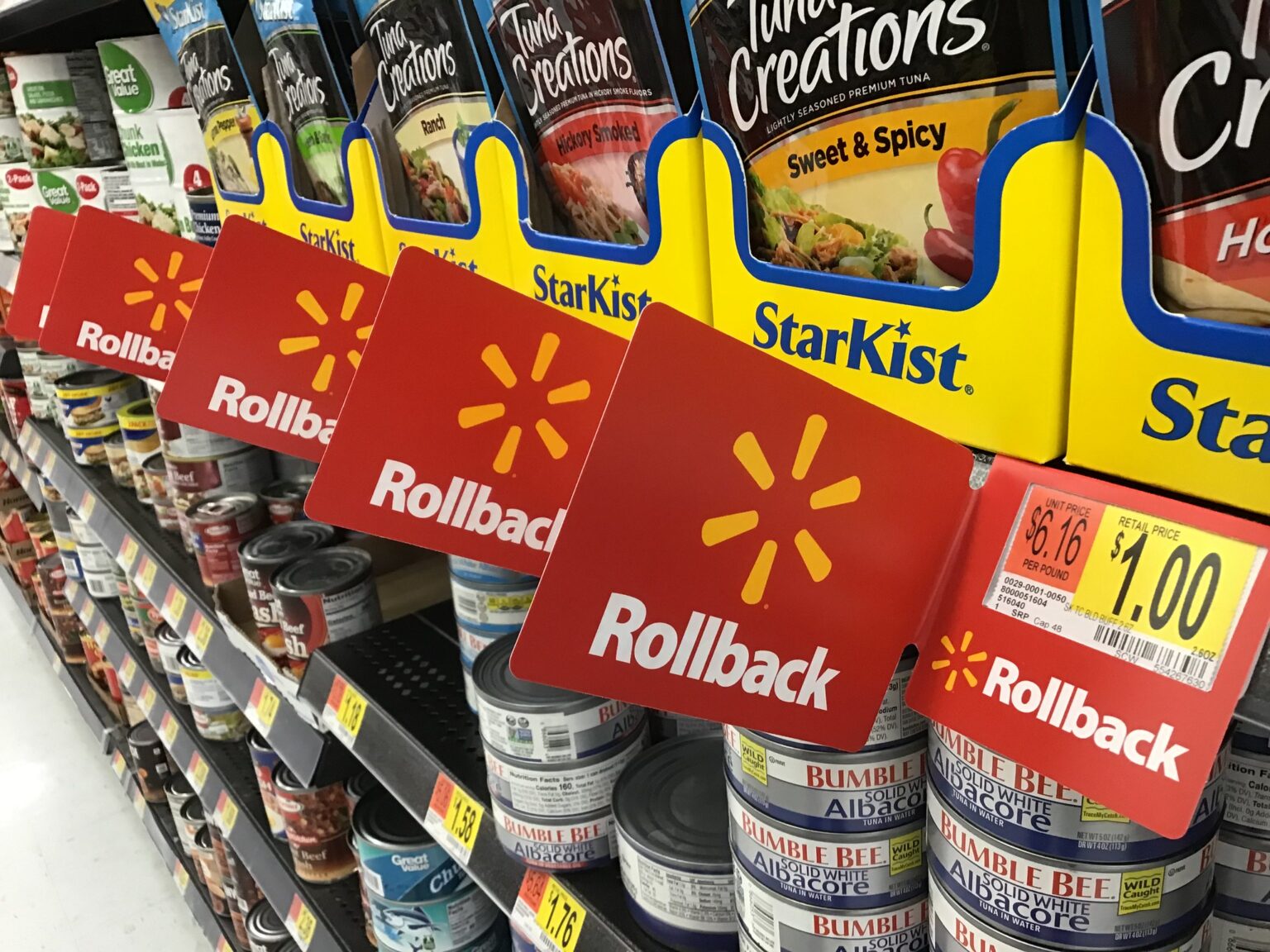Walmart has agreed to a $45 million settlement in a class action lawsuit accusing the retail giant of inflating product weights on pay-by-weight goods.
Tampa resident Vassilios Kukorinis, the main plaintiff in the lawsuit, noticed discrepancies between advertised prices and checkout charges.
The lawsuit is particularly damaging for Walmart’s image, as the company has long branded itself as a cost-effective option for low-income shoppers. This case undermines its reputation as a trusted leader in affordability, raising concerns about transparency and integrity in its business practices.
Related: McDonald’s Debuts $5 Meal Deal As Value Shifts Into Corporate Focus
Price-Per-Weight Inflation
The lawsuit alleged the store systemically overcharged customers by:
- Falsely inflating label weight
- Selling mislabeled bagged produce
- Overcharging pay-by-weight clearance items, including meat, fruits, and vegetables
All of the above are violations of the Florida Deceptive and Unfair Trade Practices Act (FDUPTA).
Failed To Take Action After 2019 WalMart Lawsuit
This isn’t Kukorinis’s first lawsuit against WalMart.
In 2019, Kukorinis notified WalMart of pricing discrepancies in a lawsuit — for the exact same reason as the 2023 class action.
In that case, the court rejected Walmart’s motion to dismiss, because Vassilios continued to purchase products for which WalMart was overcharging.
The court reasoned that “the misrepresentations were so subtle that Plaintiff and other reasonable consumers failed to notice until a closer inspection was made.”
The misrepresentations the court referred to were indeed very subtle, almost undetectable. Unless the discerning customer was paying very close attention. Kukorinis did.
In one example cited in the case, the rollback promotion price lowered the price of round steak from $8.98/lb to $7.98/lb.
The plaintiff went to buy exactly one pound of the steak, which should have cost him $7.98. While the $7.98 price was reflected on the receipt, the steak’s weight scanned as 1.13 pounds at the register.
The additional 0.13lb worked out to be exactly the price of the steak without the promotion —$8.98/lb. WalMart may have programed their point-of-sale systems to offset the promotion price by adding weight.
Ultimately, customers ended up paying $8.98/lb — despite the advertised discount price of $7.98/lb.

WalMart settled with Kukorinis for an undisclosed amount.
Error, or Systemic Dishonesty?
Large retailers, managing many products and price points, may be forgiven for occasionally making mistakes.
However, what Kukorinis demonstrated in his case that WalMart was intentionally and systemically misleading customers.
For example, it’s possible that the rollback tag was put out, but the point-of-sale system had not yet been updated to reflect the promotion price. In that case, products might occasionally scan at non-promotional prices.
But the point-of-sale system adding additional weight to various items that perfectly offset the discount requires programming the system to calculate the difference, then add weight accordingly.
Kukorinis found this discount-offset-by-adding-weight-at-the-register tactic used on multiple products at multiple locations.
WalMart May Not Correct The Issue
Whatever the settlement amount in Kukorinis’s 2019 case, it wasn’t enough for WalMart to correct the pricing issue he sued them for. Kukorinis continued to monitor the weight and pricing practices of the retail giant.
WalMart accounted for nearly 24% of all grocery spending in the U.S. in 2023. Despite his 2019 lawsuit, he continued to find pricing discrepancies in pay-by-weight grocery items. So he sued them — again.
While it may seem like trivial amounts, examples cited in the case amounted to a discrepancy between 5-13%. WalMart’s grocery operations netted over $247 billion in 2023 alone.
WalMart may have decided that a $45 million settlement was worth the risk of getting sued again. The pricing discrepancies brought in billions in revenue.
Kukorini’s second Walmart lawsuit was a civil class action lawsuit and is nationwide. The courts found that the pricing discrepancies are systemic due to issues that were discovered with their point-of-sale (POS) systems.
WalMart’s Response
WalMart denied any wrongdoing but agreed to settle the case.
This is most likely to avoid poor publicity and any damage that a lengthy court case could do to WalMart’s brand.
It’s also possible WalMart wants to avoid any formal rulings — legal precedents — regarding misleading pricing practices.
If Kukorinis’s 2019 lawsuit is any indicator, the corporate retailer may not intend to correct the problem and may once again, choose to not fix the problem.
Community Regulation
The fear of being “ripped off” at your local grocery store, big brand or not, should be a thing of the past. Legislation, policy changes, and regulatory agencies are supposed to monitor and enforce pricing practices for essentials such as food and utillites.
Related: Gavin Newsom Bans Hidden Fees In California
What the Walmart lawsuit didn’t fully reveal is how much money WalMart made from inflating the weight of its products.
Did WalMart make far more than the $45 million it settled for? Common sense would say yes. Customers should be diligent about what is advertised, what is charged at the register, flagging and documenting any discrepancies they find.
Food prices have skyrocketed since the pandemic. Official figures have the estimated food prices have increased by around 25% since 2020. However, these figures may not be capturing the full extent of the problem.
Tens of millions of American households have experienced food insecurity since 2022 amid surging food prices and costs of living.
Vassilios Kukorinis is an example of if you see something, say something.


